
Georg Janny (20 May 1864, Vienna - 21 February 1935, Vienna) was an Austrian landscape painter and set designer.

Georg Janny (20 May 1864, Vienna - 21 February 1935, Vienna) was an Austrian landscape painter and set designer.
He worked as a scene painter in the studios of Carlo Brioschi and Johann Kautsky, alongside Alfons Mucha, and was a member of the Dürerbund.
In 1898, he participated in painting the "Eisernen Vorhang" (Iron Curtain) at the Vienna Volksoper for the 50th jubilee of Emperor Franz Joseph I. In 1904, he exhibited in the Austrian Pavilion at the St.Louis World's Fair with scenes from the Imperial Royal Austrian State Railways (now at the Technisches Museum Wien). Two years later, he designed the stage for The Queen of Sheba by Karl Goldmark, one of the most popular operas of the late 19th century. Pictures from the second and third acts have been preserved. [1]
He also painted landscapes and figures, including scenes from fairy-tales or imaginary worlds that are reminiscent of the works of Arnold Böcklin or Gustave Doré.
The contents of his estate are now in the possession of the Bezirksmuseum Hernals (Hernals District Museum) in Vienna [2]
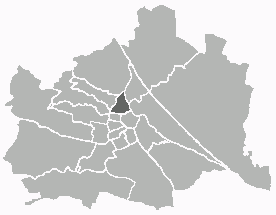
Alsergrund is the ninth district of Vienna, Austria. It is located just north of the first, central district, Innere Stadt. Alsergrund was incorporated in 1862, with seven suburbs. As a central district, the area is densely populated. According to the census of 2001, there were 37,816 inhabitants over 2.99 square km.

The Vienna Central Cemetery is one of the largest cemeteries in the world by number of interred, and is the most well-known cemetery among Vienna's nearly 50 cemeteries. The cemetery's name is descriptive of its significance as Vienna's biggest cemetery, not of its geographic location, as it is not in the city center of the Austrian capital, but on the southern outskirts, in the outer city district of Simmering.

Meidling is the 12th district of Vienna. It is located just southwest of the central districts, south of the River Wien, west of the Gürtel belt, and east and southeast of Schönbrunn Palace. Meidling is a heavily populated urban area with many residential buildings, but also large recreational areas and parks. In sports, it is represented by the FC Dynamo Meidling. Former Chancellor of Austria Sebastian Kurz was born and raised in Meidling and his private residence is there.

Hernals is the 17th district of Vienna, Austria . Hernals is in northwest Vienna. It was annexed in 1892 out of the townships of Hernals, Dornbach, and Neuwaldegg.

Ottakring is the 16th District in the city of Vienna, Austria. It is located west of the central districts, north of Penzing and south of Hernals. Ottakring has some heavily populated urban areas with many residential buildings. It was formed from the independent villages of Ottakring and Neulerchenfeld in 1892.
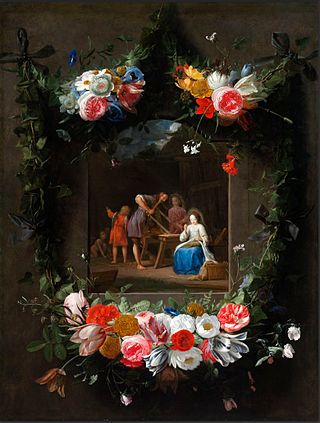
Nikolaas van Hoy, known in Austria as Nikolaus van Hoy was a Flemish Baroque painter, draughtsman and etcher.

Anton Romako was an Austrian painter.
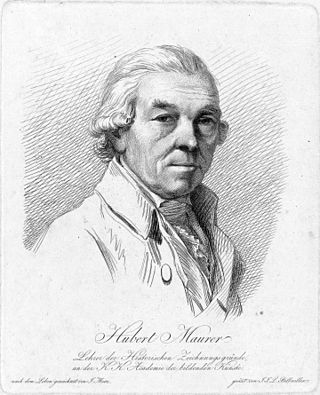
Hubert Maurer was a German painter, graphic artist and art professor.

Carry Hauser, born Carl Maria Hauser, was an Austrian painter, stage set designer and poet.
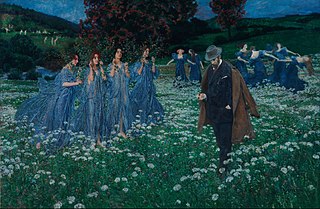
Maximilian Lenz was an Austrian painter, graphic artist and sculptor. Lenz was a founding member of the Vienna Secession; during his career's most important period, he was a Symbolist, but later his work became increasingly naturalistic. He worked in a variety of media, including oils, watercolours, lithography and metal reliefs.

Johann Baptist Wenzel Kautsky was a Czech scenic designer, landscape painter and co-owner of "Brioschi, Burghart und Kautsky", a stage decorating company in Vienna.
Hans Tietze was an Austrian art historian and member of the Vienna School of Art History.
Josefine Swoboda was an Austrian portrait painter. She was one of the most active Vienna portraitists.

August Schaeffer von Wienwald was an Austrian landscape painter and Director of the Kunsthistorisches Museum.

District Museum Brigittenau is a local museum in Brigittenau a district of Vienna, Austria / EU. It is located at the address Dresdner Straße 79.
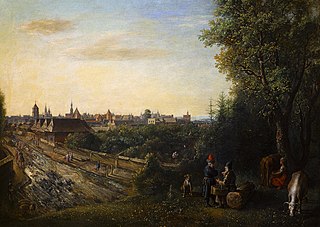
Gottfried Libalt was a German painter in the Mannerist style; known mostly for still-lifes, although he also did landscapes and portraits. He worked in Hamburg, Kraków and Vienna. Around 1660, he also spent a short time in Flanders, perhaps working with Philips Wouwerman. This has resulted in some sources referring to him as a Dutch painter.

The Alte Rathaus is a building in central Vienna, located at Wipplingerstraße 8, 1st District.
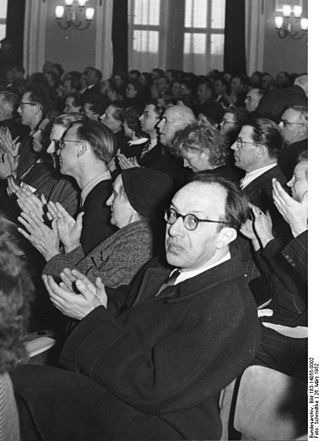
Georg Knepler was an Austrian pianist, conductor and musicologist.
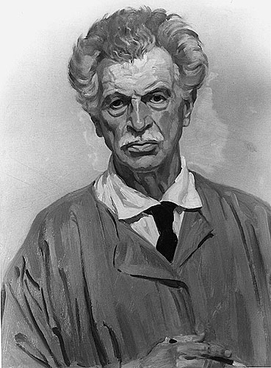
Ferdinand Andri was an Austrian architect. His work was part of the architecture event in the art competition at the 1936 Summer Olympics.

Georg Hüsing was an Austrian historian and philologist who specialized in Germanic studies and mythography.
![]() Media related to Georg Janny at Wikimedia Commons
Media related to Georg Janny at Wikimedia Commons